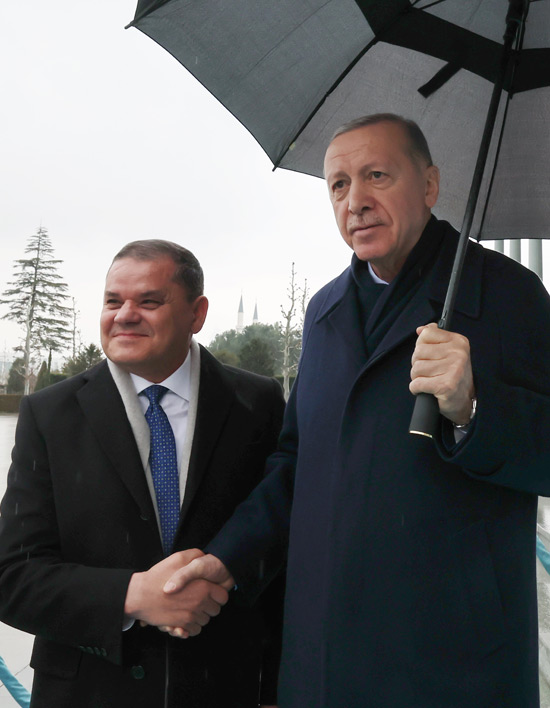Levent Kenez/Stockholm
Turkey is set to implement an agreement to enhance intelligence-sharing and law enforcement collaboration between Turkey and Libya. Signed in October 2024, the agreement outlines cooperation in counterterrorism efforts, organized crime prevention and capacity-building for law enforcement agencies. The pact establishes a secure communications channel between Turkish and Libyan law enforcement authorities for real-time intelligence exchange.
The agreement is based on the premise that terrorism, organized crime and drug trafficking are closely linked, necessitating bilateral and multilateral cooperation for effective countermeasures. It highlights the importance of joint training for law enforcement personnel as a critical aspect of international security cooperation.
The Memorandum of Understanding on Law Enforcement Cooperation Between Turkey and Libya was signed on October 23, 2024, in Istanbul. The MOU outlines cooperation in combating crime and the planning, coordination and execution of training activities between the law enforcement agencies of the two countries, aiming to strengthen security cooperation between Turkey and Libya.
The agreement includes provisions for joint training programs and technical assistance to modernize Libya’s security infrastructure. The countries will cooperate in preventing cybercrime, human trafficking and financial crimes. As part of the accord, Turkey will provide logistical and technical support to Libya’s law enforcement agencies to improve operational efficiency.
Additional clauses specify the exchange of personnel between relevant security institutions for expertise sharing and operational coordination. The agreement also outlines mechanisms for joint investigations into transnational criminal networks and establishes protocols for intelligence-sharing on terrorism-related activities.
The pact includes sections on extradition procedures and judicial cooperation, setting guidelines for the exchange of detainees and legal assistance in criminal matters. The parties agreed on the protection and confidentiality of classified intelligence exchanged under the agreement.
Turkey and Libya have previously cooperated in security matters. This agreement formalizes ongoing efforts to strengthen institutional ties and coordinate responses to cross-border threats. The agreement is part of broader bilateral cooperation efforts in the security, defense and economic sectors. Turkey and Libya continue to engage in strategic partnerships in multiple fields.
Turkey has been training Libyan law enforcement personnel for years under bilateral agreements. As part of these efforts, Turkish security forces and the Gendarmerie General Command have provided specialized training in counterterrorism and law enforcement operations in Libya.
Nordic Monitor previously reported that the security and military agreements between Turkey and Libya have granted Ankara significant privileges regarding its military presence in the North African country. A memorandum signed on March 1, 2024, in Antalya further solidified Turkey’s role in restructuring and training Libya’s armed forces. A key provision of the agreement is the legal immunity granted to Turkish military personnel operating in Libya. Under Article 11, Turkish forces are subject solely to Turkish law for any offenses committed during their official duties, effectively shielding them from Libyan jurisdiction. This clause ensures that Turkey maintains legal and operational control over its forces abroad while continuing its military and strategic cooperation with Libya.
Turkish support for the Government of National Unity (GNA) was pivotal in its success against the rebel opposition led by Egypt-backed General Khalifa Haftar. Turkey supplied weapons, ammunition and drones while also organizing Syrian mercenaries and jihadists to fight against Haftar’s forces. In November 2020 Turkey and the GNA signed a military cooperation pact and a maritime demarcation deal. While the maritime agreement, not recognized by any other Mediterranean country, delineates the Turkey-Libya continental shelf and exclusive economic zone (EEZ), the security deal enables the Turkish government to deploy its troops in Libya.

A report submitted to the UN Security Council on May 24, 2022, detailed UN investigators’ findings, indicating that the Turkish government persisted in violating UN sanctions by sending materiel and providing training to various factions in Libya.
Beyond ideological support, Turkish President Recep Tayyip Erdogan openly acknowledged the strategic importance of Libya’s oil and gas resources to Turkey. During a joint news conference with former Libyan prime minister Fayez al-Sarraj in Ankara on June 4, 2020, Erdoğan unveiled plans to expand cooperation, including exploration and drilling operations, to harness natural resources in Libyan territory.
Billions of dollars from Libyan treasury reserves are reportedly sitting in Turkish central bank accounts, earning no interest, while the Erdogan government transferred tons of gold from the Libyan central bank to the Turkish central bank. Additionally, smuggled Libyan oil is said to have made its way to the Turkish market.












